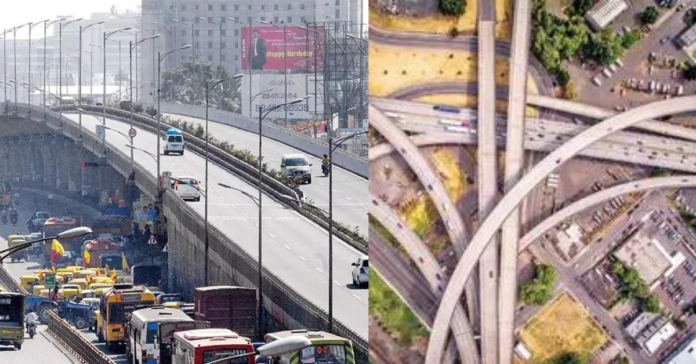In a bold move to tackle Bengaluru’s notorious traffic congestion, Deputy Chief Minister and Bengaluru Development Minister D.K. Shivakumar has announced a transformative urban infrastructure project. The State government is set to revolutionize the city’s transport network with the construction of 17 elevated corridors, covering 100 kilometers of key arterial roads, alongside a proposed tunnel road. This article explores the crucial aspects of this ambitious elevated corridor bangalore project, from its cost and design to its potential impact on Bengaluru’s traffic dynamics.
Project Overview
On July 27, Deputy Chief Minister D.K. Shivakumar launched a groundbreaking initiative to resolve Bengaluru’s traffic challenges. The plan involves creating 17 elevated corridor bangalore across the city’s major roads to convert them into signal-free stretches, thereby improving urban mobility and reducing travel time significantly.
100 Km of Elevated Corridors: A Vision for Traffic-Free Roads
The Bengaluru Development Minister announced that the project will construct elevated corridor bangalore at 17 strategic locations throughout the city. Modeled after the successful Rajajinagar-K.R. Circle signal-free corridor, this extensive development is estimated to cost around ₹12,000 crore.
The corridors will target high-traffic areas such as:
- K.R. Puram to Goraguntepalya: A 23 km stretch covering Old Madras Road, Ulsoor Lake, Jayamahal Road, Mekhri Circle, and Yeshwanthpur.
- Hosur Road: A 5.5 km corridor connecting Anepalya to Silk Board, passing through major junctions like Forum Mall and Madiwala.
- Marenahalli to Kanakapura Road: A 10 km elevated corridor enhancing connectivity to Nice Road.
Funding and Phasing
With an estimated total cost of ₹12,000 crore, the project will be implemented in phases over the next four years. The government intends to prioritize four to five corridors each year. Details regarding the funding are still under consideration.
Also read: Bengaluru Twin Tube Tunnels: Latest Insights, Cost & Major Corridors 2024
Tunnel Road Proposal: Enhancing Connectivity
In addition to the elevated corridor bangalore, a twin-tube tunnel along the north-south corridor is proposed. An 18.5 km tunnel from Esteem Mall to Silk Board is expected to further alleviate congestion and improve air quality. This proposal will be presented to the Cabinet for approval soon.
Strategic Benefits of the Elevated Corridors
- Traffic Decongestion: Eliminating signals and streamlining traffic flow will address major bottlenecks and cut down on travel time.
- Economic Growth: Enhanced infrastructure is poised to boost local businesses and stimulate economic activity across the city.
- Environmental Impact: Better traffic management will lead to reduced fuel consumption and emissions, contributing to a cleaner environment.
| Feature | Details |
|---|---|
| Project Name | Bengaluru Elevated Corridors and Tunnel Road Project |
| Announcement Date | July 27, 2024 |
| Deputy Chief Minister | D.K. Shivakumar |
| Total Length of Corridors | 100 km |
| Number of Elevated Corridors | 17 |
| Estimated Cost | ₹12,000 crore |
| Construction Phases | Four-year phased implementation; 4-5 corridors prioritized annually |
| Major Proposed Corridors | – KR Puram to Goraguntepalya (23 km) |
| – Hosur Road (5.5 km) | |
| – Marenahalli to Kanakapura Road (10 km) | |
| Tunnel Road Proposal | 18.5 km twin-tube tunnel from Esteem Mall to Silk Board |
| Funding Status | Details pending; phased funding approach likely |
| Strategic Benefits | – Traffic decongestion |
| – Economic growth | |
| – Environmental impact reduction |
Double-Decker Flyovers
The introduction of double-decker flyovers alongside metro lines will optimize land use and reduce costs. This model, recently inaugurated at the Silk Board junction, promises efficient space utilization and improved traffic management.
Also read: Bengaluru Double Decker Flyover: Stations, Route and Latest news
Additional Developments
- Mobile App for Pothole Reporting: The BBMP has launched the Raste Gundi Gamana app, enabling citizens to report potholes and expedite repairs. This new app complements the existing Fix My Street app and aims to address potholes more efficiently.
Conclusion
The proposed 17 elevated corridors and tunnel road mark a significant leap forward in Bengaluru’s transport infrastructure. With substantial investment and a well-thought-out plan, the city is set to experience a remarkable transformation in traffic management. This development will not only improve commute times but also stimulate real estate growth, attract business investments, and enhance Bengaluru’s appeal as a tourist destination.
Environmental Considerations and Sustainable Development
While infrastructure enhancement is vital, it’s equally important to focus on sustainability:
- Environmental Impact Assessment (EIA): A comprehensive EIA will evaluate the ecological effects of the projects.
- Eco-Friendly Materials: Utilizing sustainable materials in construction will reduce the overall carbon footprint.
- Traffic Management: Implementing smart transportation systems can optimize traffic flow and lower emissions.
- Green Spaces: Incorporating green areas and pedestrian-friendly zones will enhance the city’s livability.
With these considerations in mind, Bengaluru is poised to embrace a future of streamlined transportation and sustainable urban development.
Frequently Asked Questions:
The project involves constructing 17 elevated corridors spanning 100 kilometers and a proposed twin-tube tunnel to ease traffic congestion and improve urban mobility in Bengaluru
The total estimated cost of the project is around ₹12,000 crore.
The project includes 17 elevated corridors at key locations such as KR Puram, Hosur Road, and Marenahalli.
The planned tunnel will be 18.5 kilometers long, running from Esteem Mall to Silk Board.
The project will be implemented in phases over the next four years, with 4-5 corridors prioritized annually
Suggested Articles:
Bengaluru Twin Tube Tunnels: Latest Insights, Cost & Major Corridors 2024
New Bengaluru Metro Yellow Line: Stations, Operating Hours, and Economic Impact
Bengaluru Double Decker Flyover: Stations, Route and Latest news


